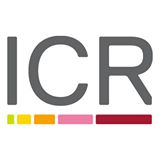Progress report developed for Cancer Research and Genetics UK in collaboration with Professor Ros Eeles and Dr Zsofia Kote-Jarai.
July 2025
 We are enormously grateful to the Trustees of Cancer Research and Genetics UK, particularly to Nick Philips, for the long-standing support of The Institute of Cancer Research (ICR). The generosity of organisations such as yours is critical to our mission of making the discoveries that defeat cancer.
We are enormously grateful to the Trustees of Cancer Research and Genetics UK, particularly to Nick Philips, for the long-standing support of The Institute of Cancer Research (ICR). The generosity of organisations such as yours is critical to our mission of making the discoveries that defeat cancer.
I am delighted to provide you with an update on our prostate cancer research written in conjunction with Professor Ros Eeles (pictured below) and Dr Zsofia Kote-Jarai – Senior Staff Scientist in Ros’ Team. I hope you find the progress being made of interest and will be inspired to continue your generous support of this work in the future.
Progress over the past year
The Illumina MiSeq sequencing machine has been essential to the research in multiple clinical studies led by the ICR Oncogenetics team. For example, we perform germline genetic testing as part of our research efforts, using the PRODICT test – we have developed this new genetic test aiming to change and improve the current diagnostic/clinical pathway for prostate cancer and potentially be used for a National Cancer Screening Programme. We have shown that this ‘spit test’, where a sample can be collected at home, is more accurate at identifying future risk of prostate cancer for one group of men than the current standard blood test.

The PRODICT test includes the targeted sequencing of 117 genes involved in DNA repair, damage response, and hereditary cancer predisposition, as well as the genotyping of 130–440 prostate cancer risk variants – both those common and rare in prostate cancer.
We have mainly used the PRODICT test in our key studies including PMPrC, BARCODE 2, and PROFILE. In each study, we receive blood or saliva samples from participants, extract the genomic DNA (gDNA) and then run the PRODICT test to sequence it using the Illumina MiSeq machine. 2
- The PMPrC (Precision Medicine in the Prostate Cancer Care pathway) study investigates how a combined panel of rare and common genetic variants can be used in a clinical setting to guide prostate cancer risk assessment, screening, and treatment decisions.
- BARCODE 2 (targeting Cancer Care with the Use of Genetic Profiling) clinical trial evaluates the response to two cycles of platinum chemotherapy in men with metastatic castration-resistant prostate cancer (mCRPC) who carry a DNA repair gene mutation. The study also investigates overall survival outcomes and the prognostic relevance of these mutations.
- The PROFILE study aims to determine whether existing genetic tests and family history profiling can be used to find men at higher risk of prostate cancer, so they can be targeted for screening. It will compare rates of prostate cancer diagnosis between men considered to be at higher and lower genetic risk.
Over the past year, we have successfully sequenced samples from 440 individuals in the PMPrC study, 50 individuals in BARCODE 2, and 127 individuals in PROFILE, totalling 27 sequencing runs performed on the Illumina MiSeq.
A study saving lives already:
Dheeresh Turnbull, 71, from Brighton, was diagnosed with prostate cancer through one of the studies led by Ros three years ago.
He was referred to our clinical partner, The Royal Marsden, where he underwent robotic surgery to remove part of his prostate and is currently doing well.
Dheeresh said: “I was completely shocked when I received my diagnosis as I had absolutely no symptoms at all, so I know I would never have been diagnosed at this stage if I hadn’t joined the trial. Because the saliva test revealed that I had a high genetic risk of developing the disease, my younger brother, who would have been too young to join the study directly, signed up and discovered that he also had an aggressive tumour in the prostate. It’s incredible to think that because of this study two lives have now been saved in my family.”
We are deeply grateful to Cancer Research and Genetics UK for your continued support of our research here at the ICR. Your contributions have enabled this vital work in Ros’ lab to continue. We would be very appreciative if you would consider continuing your support for the genetic studies being enabled by work on the MiSeq machine, which remains essential to the success and progression of Ros’ research.
For further information please contact:
Beth Sinclair
Trusts & Corporate Fundraising Executive
E: beth.sinclair@icr.ac.uk
T: +44 203 437 7064
Registered address: 123 Old Brompton Road, London, SW7 3RP. Company Limited by Guarantee. Registered in England No. 534147. A Charity, Not for Profit. Registered with HMRC using ref: x90004 Accounts: www.icr.ac.uk/about-us/how-we-are-funded/annual-reports